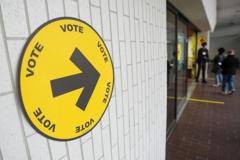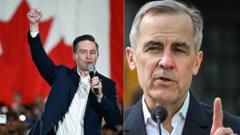In the backdrop of escalating tensions with the United States, Canadians are casting ballots in a parliamentary election with key issues of tariffs and national autonomy at the forefront.
Canada Faces Crucial Choice in Election Amid U.S. Influence

Canada Faces Crucial Choice in Election Amid U.S. Influence
Voters in Canada head to the polls, influenced by economic concerns and U.S. relations.
As Canada approaches a pivotal parliamentary election, voters find themselves grappling with significant challenges related to the U.S., particularly the implications of President Trump's policies. The election is framed between two prominent leaders: Mark Carney, the incumbent Prime Minister representing the Liberal Party, and Conservative Party leader Pierre Poilievre.
Central to the election discourse are pressing economic issues exacerbated by Trump's tariffs on Canadian goods and startling declarations suggesting Canadian annexation. According to Matina Stevis-Gridneff, Canada bureau chief, these dynamics have created a sense of urgency among citizens. Many Canadians are distressed about their country’s economic vulnerability, which is seen as a failure of the Liberal government that has been in power for ten years.
Voter sentiment appears divided. Some are eager for a change and are leaning towards the conservatives, enticed by promises of reduced government intervention, tax advantages, and deregulation. However, there remains a substantial segment of the electorate that prioritizes a united standagainst U.S. aggression, favoring Carney's leadership. Carney, a recognized figure in international economic circles, is believed by many to be the most capable leader to navigate Canada through its current challenges.
As the results unfold, the implications of this election go beyond mere governance, touching on fundamental questions of national identity and economic survival in a world increasingly shaped by American politics.






















